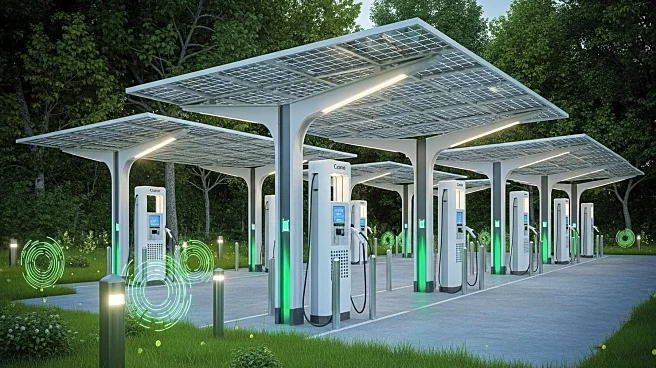What is the story about?
What's Happening?
Rivian is investing $5 billion in a new electric vehicle plant in Georgia, aiming to produce between 200,000 and 400,000 vehicles annually. The plant, set to begin production by 2028, is part of Rivian's strategy to expand its market presence and achieve profitability. The project, which includes a $1.5 billion state and local incentive package, is expected to create 7,500 direct jobs and an additional 8,000 indirect jobs. Rivian has also secured a $6.6 billion federal loan to support the construction. The plant will focus on the production of the R2 SUV, a more affordable model starting at around $45,000, which is crucial for Rivian to reach mass-market scale.
Why It's Important?
The establishment of Rivian's Georgia plant is significant for the U.S. electric vehicle industry, as it represents a major investment in domestic manufacturing capabilities. This move is crucial for Rivian to compete with established players like Tesla and Ford, who are also expanding their EV production capacities. The plant's success could help Rivian transition from a niche luxury brand to a mass-market contender, potentially increasing its market share. Additionally, the project aligns with Georgia's economic strategy to become a hub for EV manufacturing, which could have long-term benefits for the state's economy and job market.
What's Next?
Rivian faces several challenges, including execution risks in construction and ramp-up, as well as competition from other automakers. The company must also navigate a changing political landscape, as federal EV tax credits are being rolled back, which could impact consumer demand. Rivian's leadership remains confident in the product's appeal and is focused on achieving high-volume production to ensure profitability. The next few years will be critical for Rivian as it seeks to establish itself as a major player in the EV market.
Beyond the Headlines
The development of Rivian's Georgia plant highlights the broader trend of increasing investment in U.S. EV manufacturing. This shift is driven by both economic and environmental considerations, as automakers seek to reduce emissions and meet growing consumer demand for electric vehicles. The project also underscores the importance of strategic partnerships and government support in advancing the EV industry. Rivian's success could serve as a model for other startups looking to scale up production and compete with established automakers.
















